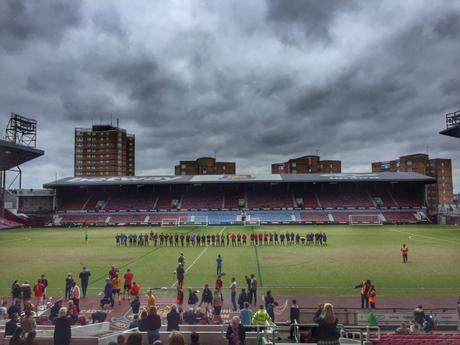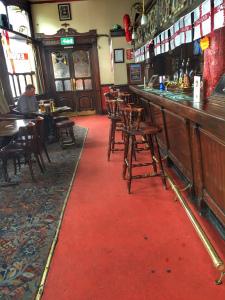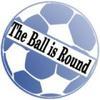When Bobby Moore virtually turned the lights out at The Boleyn Ground around 11.33pm on Tuesday 10th May, most West Ham fans shed a tear as the fine old stadium went dark for the last time. Time to move on, even if like me, some questioned the need to move in the first place. The season had been a huge success on the field with Bilic soon putting the pre-season critics in their place with a superb campaign even if two defeats in the last three games cost the club a first-ever Champions League spot. But thanks to Manchester United’s FA Cup Final win last week over Crystal Palace,the Hammers will once again compete in the Europa League although that now poses an issue of where the home leg will be played after the club has sold over 50,000 seats for the opening game at The Olympic Stadium against Juventus due to take place after that tie.
However, since the Manchester United game the club has come under criticism for hosting a number of other games. Whilst they may have a charitable motive, the fact that the much-hyped United game wasn’t the last game has seriously irked the fans. A proposed West Ham Ladies game on 5 June was cancelled after nearly 12,000 fans voted to whether it should go ahead. Despite over 50% voting in favour of the game! the club cancelled the game influenced by comments on social media! meaning the Manchester United game would be the last public fixture played at The Boleyn Ground. Except it’s not.
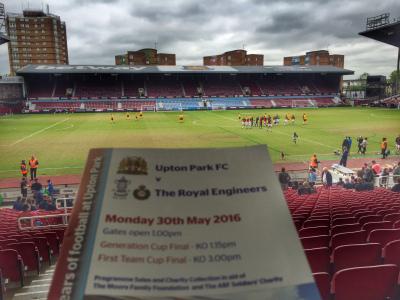
Upton Park FC had been dissolved back in 1911 and whilst former FA Cup winners, Royal Engineers, still have a team today, there was no link at all back to West Ham United or The Boleyn Ground. Both teams actually took part in the first ever FA Cup back in 1871 with Upton Park losing 3-0 at home (West Ham Park) to Clapham Rovers whilst Royal Engineers made it to the final, losing 1-0 to Wanderers. The two clubs actually played each other in the 1879/80 FA Cup at the 2nd Round stage with the Engineers running out 4-1 winners. Despite their name, they had nothing to do with West Ham United nor ever played at The Boleyn Ground. The annual performance of the club in The FA Cup did inspire Thames Ironworks who moved to West Ham in 1897 after entering the competition themselves for the first time the year before. Thames Ironworks became West Ham United in July 1900 and moving to the Boleyn Ground four years later.
But just a few months into the life of West Ham United, Upton Park FC had their finest hour, winning an honor that no English football club can ever lay claim to. The date is 20th September 1900. The place, The Vélodrome de Vincennes in the south-east of Paris. In front of a crowd of approximately 500 locals the Great British football team had just beaten their French counter parts 4-0 and in the process won Gold in the first Olympic games of the modern era.
The 1900 Summer Olympics were notable for being rather different from the ones we can expect later this year. For a start the games opened on 14 May and did not finish until 28 October. And then there was the events themselves. We may scoff at events such as Beach Volleyball and BMXing, but back in 1900 we had ballooning, cricket (England beat France), Basque Pelota and my personal favorite the 200m swimming obstacle race (Gold won by Great Britain’s Frederick Lane). And there was the shortest Olympic event – the Tug of War – where a combined Danish/Swedish team took Gold from the French in a competition that took 3 minutes 12 seconds from start to finish.
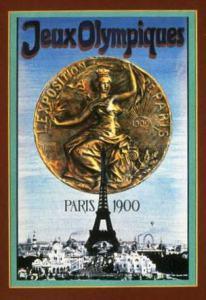
But let’s get back to the football tournament. As opposed to picking the best players of the time, the Football Association decided to ask Upton Park FC to represent Great Britain. Quite why they picked a Non-League, amateur side who just a few years before had disbanded is a mystery that time and tide has erased, but they justified the decision by winning gold.
Sounds an impressive achievement doesn’t it? Well let’s look at the truth. Football had been introduced into the games as a Demonstration event. Originally the tournament was to feature five nations – France, Belgium, Switzerland, Germany and Great Britain. Right up until the day of the first game it was expected to be a five way contest but for some reason the Germans and the Swiss didn’t bother sending teams so instead it was decided that it would just be a three team tournament.
In the first game Union des Sociétés Françaises de Sports Athlétiques, representing France, were drawn to play Upton Park. A very comfortable four nil win for the British put them on the verge of a Gold medal for just 90 minutes work. Three days later the French side beat Université de Bruxelles 6-2 meaning a third and final game was not necessary. The Belgians could not win gold and so the first ever Olympic football tournament was won by Great Britain, or more precisely, Upton Park Football Club.
At the time the team weren’t actually awarded any medals or even a cup. Some years later the IOC awarded the club the “honour” of a gold medal, but as they had finally disbanded in 1911 nobody actually knows what happened to any award. As it was a demonstration event they probably just had a cup of tea and a cucumber sandwich or two before they returned back to Blighty.
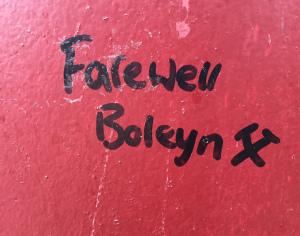
Upton Park FC 2 Royal Engineers 0 – The Boleyn Ground – Monday 30th May 2016
At first glance it appeared this was a wind-up. There was no game on, nor did it appear that there was any life in the stadium at all. A group waited outside the main entrance for their tour to start but then I spotted an open door on the corner of the Main and Sir Trevor Brooking Stand. No signage, no stewards, no posters – just an open door. Once inside the inner-sanctum of the Main Stand I paid my money for the charity programme and took a seat just as the two teams came out for the first game. It was surreal to say the least. Around 100 spectators were spread across the lower tier of the Main Stand. The constant sound of drills from the Bobby Moore Stand filled the air as the club had begun to remove them, with fans having paid £50 for a bit of old plastic. Every possible sign in the stand, such as on the toilet doors had already been removed, as too had the big screens in the corners, in preparation for the final public event, the grand auction (only £25 to get in by the way) being held next weekend.
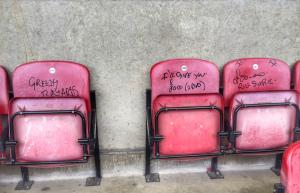
The second game saw the two “first teams” play each other. Upton Park included former West Ham keeper Neil Finn in their squad. Finn played in the same Youth Team as Lampard and Ferdinand and became the youngest ever Premier League player when on 1st January 1996 he was drafted in to play against Manchester City at Maine Road after Les Sealey, deputy to the suspended Ludek Miklosko, was taken ill. Miklosko’s wife had to sew numbers onto the back of Finn’s shirt in the hours before the game, which West Ham lost 2-1.
